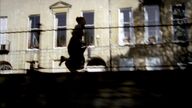' "Persuasion"
Anne
undoubtedly Anne's "happiness" is the ultimate victory of "self-resistance". She is dignified and graceful, but lacks assertiveness; she considers worldly values, but longs for "self-liberation".
In reality, such women are nothing but cute and lovable, but you always feel that something is missing. Their passions are all hidden in places where no light can be seen. To use a modern term, it is called "suffocating". Their feelings are rich and delicate, but they are too stubborn to express their own needs.
Rules exist because of the need for "rationality", and we need "rationality" because life needs "order". Mrs. Russell's "persuasion" is based on "practical" considerations. You can say that she is snobby, but in fact, the "snobby" of this hierarchy has been maintained until modern society. Aside from the emotional level, the so-called "smart women are hard to cook without rice", perhaps today's mothers will still tell us "love without an economic foundation is very difficult" in an instructive tone, but in fact this is a kind reminder, and choosing The key is you, and now is the time to test your determination.
It's a pity that Annie, who lacked assertiveness at that time, gave up a man's sincerity and compromised the world. After eight years of absence, Wentworth, who was once despised by the world, took a new look and stood on the "front" of those who despised him back then. Ironically, Annie, who was a "leftover girl" at this time, stood at a disadvantage. "The opposite". This is probably the so-called "Thirty Rivers East and Forty West".
The greatest obstacle to freedom is fear. Because of fear, it is necessary to follow the "rational" behavior under the standard of social discipline as the criterion, and the root of all this is that the society lacks tolerance, and people run against each other.
Eight years later, in the face of the second "persuasion", Annie resolutely gave up continuing to be a worldly disciple and chose to follow her own heart. At this time, the "leftover girl" Annie, aside from the technical level, chose to follow herself and return to herself. She also finally "no longer" fear and chose to release freedom.
Mrs Russell
I have to say something about this old woman. Although she looks cold and old-fashioned, it can be seen that she takes care of Annie, but Annie is always a marionette in her hand. She was the spokesperson for the entire secular society at that time!
I couldn't help comparing her to Claire in "wives and daughters", and I found that they were not on the same level at all.
Perhaps it has a lot to do with the plot design of the film. Although Claire is hypocritical and snobbish, there is no suffocating sense of oppression. Russell, the old guy, has a cold face with clear lines and sharp eyes. The demure and dignified temperament forms a sharp contrast, which represents the relationship between oppression and the oppressed, and the whole film also makes people feel depressed and suffocated. You finally feel a sense of relief.
Do you feel terrified when the worldly faces look down upon us with a sanctimonious stance? But one thing is for sure: Russell will never, because only in their presence can she feel free. This is the spiritual destination of all despots and oppressors.
"The Female Tenant"
Helen
This is such a peculiar woman. She is peculiar: First, she disregarded the objections of the world, and resolutely chose the person she loved, even though the man was notorious; second, in the face of this unbearable reality, she did not escape, and at the same time faced it soberly, she did not complain or complain. Bearing it alone, when she finally couldn't bear it anymore, she resolutely chose to leave, still doing her own way and disregarding the worldly vision.
This is in stark contrast to Anne's personality. Both of these women are not good-looking and have the same beautiful but very different personalities. Helen has always stood on the opposite side of the mundane, but in the face of an increasingly repressed environment, she finally could no longer turn a blind eye to her face, and she was stinged.
In the face of that unfaithful husband who was terminally ill, she resolutely rejected the marriage proposal of another man she loved and chose to take care of the walking dead until the end; she loved her children, but did not spoil her, and she hated her husband, but did not treat her. Their own emotions are instilled in their children.
She is strong and sensitive, independent and strong. In the face of gossip, she feels repressed but does not explain anything, sticks to her own principles, and ignores the opinions of others. Facing the woman who deliberately made things difficult and humiliated her, she chose to remain silent and leave, even if she shed tears, she would never be in front of such people, which even set off the pretentious but despicable face of the "contempt" person.
It's not easy for a mother with a child alone, especially for a woman of her nature, but in the end she survived with her own hands. She has always relied on her own strength to resist the snobbery around her that oppressed her, so Helen became herself.
Conclusion
In a HEXIA society, perhaps you and I have doubted "what is 'meaning'?" Where there is oppression, there is resistance, and where there is resistance, there is a distinct life.
In the face of circumstances or forces that go against your will, you become what you choose. And "I" can only be sought from resistance.
View more about Persuasion reviews











